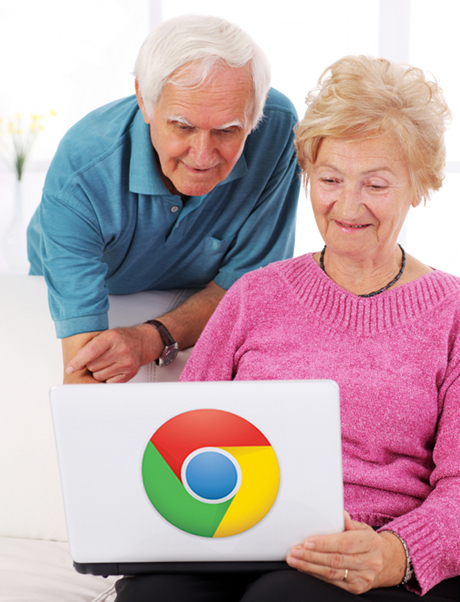Chromebooks: The choice of the AARP generation?


Chromebooks might not excite the savvy Windows, Mac or iPad-wielding techno-literati, but an entire generation of older users may flock to them for user-friendly web access.
When the first Chromebooks were announced with inital pricing and data plans, I wasn't very impressed. In fact, I thought that to buy one at the current prices, you had to be flat out crazy.
I mean $350-$430 for a device that simply browses the web? Are they meshugge? What is Google and its OEM partners smoking, exactly?
This is not to say that I think that Chrome OS has no technical merit nor its proper use case. In fact, I've been involved with Google's Chrome OS Cr-48 notebook beta for quite a while now.
I spent an entire Christmas vacation using one as my exclusive computing device, after which I returned it to Google. For my efforts, Google finally sent me one to use on my own.
What did I do with that device? Well, after playing with it for a few days, I decided to give it to my In-laws, Sandy and Bob.
Now, as many of you know who have read this column in the past, my in-laws have been a constant source of article inspiration. When it comes to blowing up Windows boxes, or encountering some kind of bizarre end-user snag that a IT pro wouldn't normally encounter in a managed enterprise environment, my in-laws will definitely get hit with it.
My in-laws are pure New Media tech punditry gold.
Also Read:
- Chrome OS? Sign me up. ChromeBook? Not so much.
- A Very Chrome-y Christmas
- The PC Industry's forgotten market: Grandpa
Some of this stuff which I've written about is typical user carelessness or due to a basic lack of understanding of the platform they use. And that's to be expected, because my 70+ year-old in-laws are not technologists. They're end-users.
So I dropped the Google Cr-48 off at my In-laws a few months ago, with the intention that the primary user would be Bob, who has become more homebound as of late. As most of his computing activity was centered around browsing and email, I thought he would be the perfect candidate for the device.
I didn't hear back from my in-laws for a few months regarding the prototype Chromebook. I figured they had lost interest in it.
Well as it turns out, my mother-in-law, Sandy, has taken to it like a fish to water. She loves the thing. In fact she likes it so much that she's pretty much stopped using her Windows 7 notebook, a Lenovo ThinkPad T61 which lives upstairs in her home office with the wireless printer.
During our Father's Day weekend barbecue at their house, I asked Sandy why she was using it more than her ThinkPad.
"Well, I like to be down here near the bedroom, kitchen and living room, and it's lighter and easier to move around than the other laptop. And it's very easy to use."
"Do you use it for everything?"
"Just about. I access my real estate agency's Multiple Listing Service and stuff with it. The only thing I can't do is print."
"I can make it print, as long as your laptop upstairs is turned on, so it acts as a Cloud Print server."
"Really? 'Cause that would be great, then I'd only have to go upstairs when something gets printed."
"Yeah. I can do that. Is there anything else that it doesn't do?"
"I'd like it to have a word processing program so I can type things out."
So what did I do? I logged onto the Chrome Web Store, installed a Google Docs icon on the device, and showed her how to use it. Problem solved.
"So is Google actually selling these things now?"
"Yeah, but they're selling them for about $350-$400."
"That's too much money. I'd pay $250 for one of these."
And there lies Google's problem. They've got a great OS and device that would be ideal for neophytes and basic end-users, but the darn things cost too much money.Especially for seniors on fixed incomes.
What can Google do to resolve the situation? Well, if a big potential seed market for Chrome OS is seniors, then I would partner with a large company such as AARP which could leverage its purchasing power to get them out cheaper to their target audience.
An organization that powerful could take the COSTCO approach and even contract brand their own device or a special model, such as a Wi-Fi only version with a larger screen. Or even a $99 "ChromeTerm" that any senior with a large screen TV and a wireless keyboard/touchpad combo could use from their couch.
Perhaps even leverage the "Special Offers" ad-supported demographically-targeted business model that Amazon is taking with their reduced-price Kindle, in order to keep the costs down.
True, many seniors might not be able to get access to broadband. But there are plenty of ones like Sandy and Bob who can. And I'm betting that if Google can keep costs down on the hardware, they'll see Senior adoption of Chrome OS like they take to knitting, Metamucil and Cialis.
Could Google's Chrome OS take off with Seniors for the right price? Talk Back and Let Me Know.